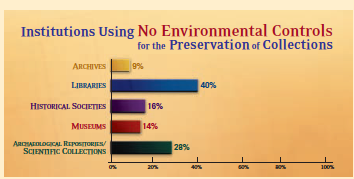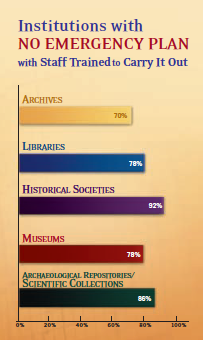In a report now 14 years old, the Heritage Health Index (HHI) completed the first survey of the nation’s cultural health. Heritage Preservation, in partnership with the Institute of Museum and Library Services, surveyed hundreds of institutions in the United States and Territories to document the condition of the country’s physical and digital resources. Libraries and historic societies are repeatedly listed as the worst offenders whether it be the lack of paid conservators or the absence of an emergency preparedness plan to protect collections (see graphs for some examples from the report)


Rather than enumerate all the report’s specific findings, I want to talk about why libraries and historic societies are the least prepared or proactive in the health of their collections.
Reason Number One: A Devalued Resource
Consider this quote from the HHI report:
“Individuals at all levels of government and in the private sector must assume responsibility for providing the support that will allow these collections to survive.”
To survive, historic societies are mainly supported by private boards or foundations. City or state libraries obviously operate with government funds, but do not receive enough funding to maintain their collections, staff, and public programs at the same time without the help of a private trust. Additionally, I doubt government officials see historic artifacts and book collections as public intellectual property. Governments do not fund cultural institutions properly since they do not understand their responsibility as officials representing the people of their districts.
Reason Number Two: Different Priorities
This one relates specifically to libraries rather than historic societies: An archive and a library seemingly serve the same function, right? However, which type of institution is more accessible to the community? Typically, a library collaborates with and provides services for a broad audience, while archives generally serve a more exclusive, academic public. Libraries prioritize public engagement over collections, so obviously they do not spend what little funds they have on preservation. In the interest of full disclosure, I think that education and interpretation should be prioritized over preservation, but obviously, when neglecting to maintain longevity of the resources, libraries are explicitly neglecting their commitment to the community. Preservation ensures the life of the collection, but what good is a collection that stays locked away?
Can we choose an approach that works for us? I mean, if the holistic view is like a hitting a brick wall, and is impossible to address, is it bad policy to pick off opportunities as they arise? I mean, it may be the best any organization can do.
Right, it really is impossible with the financial restraints placed on almost every institution.
However, I want there to be a solution beyond a piecemeal addressing of problems. Financial struggles have/will always plague cultural work, but I think structural, big changes can direct us toward more lasting stability--integrating digital initiatives, collaborating with and giving leadership positions to members of the local community, divesting from the executive board model, partnering with other institutions, etc.